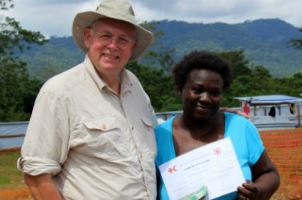.jpg.aspx?width=320&height=171) In a remote village in southeast Guinea, a mother and her children are reunited with the husband and father they once feared they had lost to the Ebola virus disease. Around them, hundreds of villagers clap, sing and dance to celebrate Mamadou Noumou Diallo’s safe return to Kérouané. The 42-year-old popular coffee bar owner is thinner than when they last saw him a month ago. He is also dressed in clothes they have never seen before, and his pockets are empty of his identification card, motorcycle licence, and Red Cross volunteer card,
In a remote village in southeast Guinea, a mother and her children are reunited with the husband and father they once feared they had lost to the Ebola virus disease. Around them, hundreds of villagers clap, sing and dance to celebrate Mamadou Noumou Diallo’s safe return to Kérouané. The 42-year-old popular coffee bar owner is thinner than when they last saw him a month ago. He is also dressed in clothes they have never seen before, and his pockets are empty of his identification card, motorcycle licence, and Red Cross volunteer card,
|
Photo credit: Helena Humphrey / IFRC |
{^youtubevideo|(width)560|(height)340|(rel)True|(autoplay)False|(fs)True|(url)http://www.youtube.com/watch?v=P9PHHiQq2OE|(loop)False^}

The outgoing nurse spent six days in the treatment centre before being declared Ebola-free. During this time she made her presence known to all staff and patients who were all drawn to her warm personality.
Photo credit: Lisa Pattison / IFRC
“Of course my family will be happy to see me. But there will be others who are afraid of me. I’ll have my certificate saying I’m Ebola-free and I’ll talk to them to tell them I’m not sick. I’m expecting them to be frightened, but I’ll educate them that I’m well.”
Since it opened in September, the Red Cross treatment centre in Kenema has discharged 149 patients, however, reintegration can be an immense challenge as fear and stigmatization can result in the former patients being ostracized. Each is discharged with a certificate stating they are Ebola-free. They also receive a start-up kit consisting of food supplies, a mattress, basic non-food items, and the equivalent of approximately 34 US dollars to help facilitate their return.
To ensure their successful reintegration, Red Cross volunteers engage communities before the survivors return to explain that they are no longer infectious. Survivors are also monitored after returning to their homes, and continue to receive psychosocial assistance from the Red Cross.
The Red Cross continues to mobilize support and call for trained healthcare personnel from Canada and elsewhere to respond to the Ebola outbreak. Local staff and volunteers from affected countries in West Africa are also playing important roles.
Canadians can donate to the West Africa Ebola Fund to support ongoing efforts to stop the spread of Ebola.
The following appeal is now closed. You can support our ongoing work by donating to the Canadian Red Cross.

